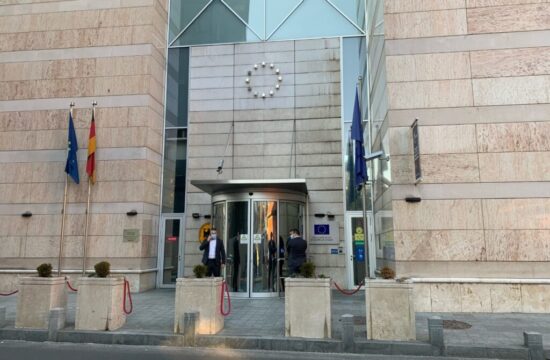Decisions about US sanctions are taken in a very rigorous process that involves evidentiary standards, the US Ambassador to Bosnia and Herzegovina Michael Murphy said in an exclusive interview with N1. “It is very difficult to be removed from the blacklist, because if you've engaged in a behaviour that is sanctionable, there is a consequence to that,” he underlined. Ambassador Murphy talked to N1's Ika Ferrer Gotic. Pročitaj više
In the latest set of sanctions on the individuals and business entities in Bosnia and Herzegovina, in October 2023, US Department of Treasury introduced new sanctions for the family of Bosnian Serb leader Milorad Dodik – his daughter Gorica and son Igor over corruptive activities.
The US authorities imposed sanctions against Dodik himself on January 5, 2022, as well as on July 17, 2017, for obstructing the Dayton Peace Agreement.
Dodik denied his family's involvement in corruption and said he was convinced that “that the people of Republika Srpska will not believe all these lies.” He also insisted that the sanctions are imposed “without having any evidence of any criminal activities.”
Commenting on Dodik's words, the ambassador said:
“Milorad Dodik may not recognise the sanctions but sanctions recognise him.”
The ambassador unveiled that some of the sanctioned individuals may say they do not care or that the are not bothered by those measures, but “they are spending time and money to try to get off the blacklist.”
“There is a clear impact on the lives of the individuals and those around them from these sanctions, whatever they may be claiming in public. We are using these sanctions to go after the individuals who are engaged in anti-Dayton activity, anti-democratic activity or corruption,” Murphy said, adding that the sanctions are also meant for “subordinates who follow orders.”
According to him, some sanctioned individuals hired lawyers in Washington to try to get off the blacklist but with no success.
“It is very difficult to be removed from the blacklist, because if you've engaged in a behaviour that is sanctionable, there is a consequence to that,” he stressed.
Speaking of the steps that lead to the decision on sanctions, Murphy explained that there is a “rigorous process,” which involves multiple different agencies of the US government that get together review the facts, the evidence and then make a determination whether or not an individual, a business or an entity has engaged in anti-Dayton behaviour or other destabilising actions that threaten the security, sovereignty, territorial integrity of Bosnia and Herzegovina, anti-democratic activities or corruption.
As for the role of the US Embassy in the process, the ambassador said the embassy is involved as much as in shaping of any policy towards Bosnia and Herzegovina. But, the final decision is done by the Department of Treasury
Asked if the sanctioned individuals should be part of public life in Bosnia and Herzegovina, the ambassador assessed as “disappointing” seeing the sanctioned individuals in positions of government of public office.
He stressed it was not on the US government to make decisions on appointments in Bosnia and Herzegovina, but it can “lift the veil of impunity” that exists for some of these individuals.
“And if some voters use that information to make decision about who to vote for, than it is a good thing. Ultimately, the institutions of Bosnia and Herzegovina have to hold individuals accountable . We can help but that is the responsibility of local actors,” he said, underlining the necessity of the public institutions to do the job they are designed to do – to work on behalf of the citizens of this country.




Kakvo je tvoje mišljenje o ovome?
Budi prvi koji će ostaviti komentar!